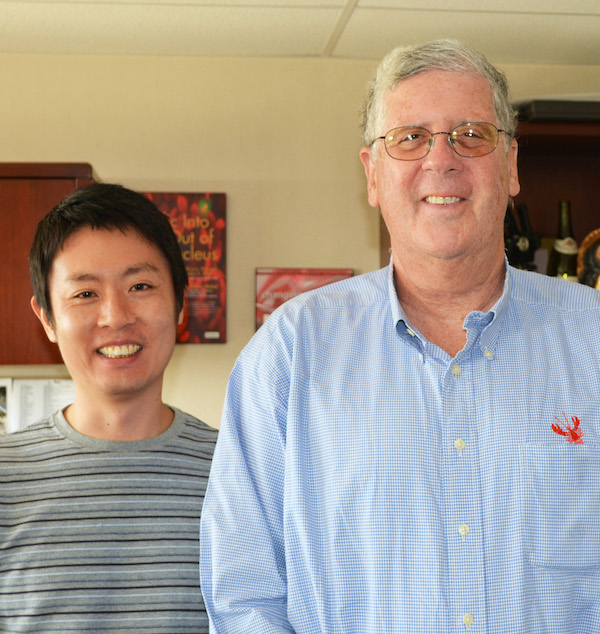Daily Business Report/Dec. 6, 2016
Source: Lockheed Martin (left); General Dynamics NASSCO (right). (GAO)
GAO Seeks End to Funding
For Littoral Combat Ships
The Government Accountability Office has recommended Congress to not fund the acquisition of two Littoral Combat Ships requested for 2017 due to what auditors identified as the vessel’s obsolete design and construction backlogs.
The fate of the program would affect General Dynamics NASSCO in San Diego, one of the two major builders of the ships. The other is Lockheed Martin.
A GAO report says the Defense Department has not fully implemented prior recommendations regarding LCS and frigate acquisitions such as the use of a business case to balance resources.
Auditor noted cost, capacity and schedule of LCS expectations have degraded from 55 ships at $220 million each to 40 vessels at an estimated $478 million per platform.
Congress must decide whether a ship that costs twice as much yet delivers less capability than planned warrants an additional investment,” the GAO said Thursday as the Senate Armed Services Committee met to review the $29 billion program.
Congress will make a decision on funding and oversight of the program to tackle acquisition of two additional baseline LCS in fiscal year 2017 and the authorization request to purchase 12 frigates in fiscal year 2018.
The Navy took a revolutionary, dual ship approach to buying the Littoral Combat Ship over a decade ago, but this approach has fallen short. LCS has taken longer, cost more, and delivered less capability than expected. The Navy recently decided to pursue a modified LCS that it calls a frigate.
The Navy intends to commit quickly and buy 12 frigates, but the ship’s design, cost, and capabilities remain uncertain.
“Given the cost overruns, mission package testing woes and the rate of engineering failures, reducing the size of this program is a necessary first step,” Senate Armed Services Committee chair Sen. John McCain said at the committee hearing. “I am prepared to go even further by taking a hard look at any further procurement of ships until all of the mission packages reach IOC,” or initial operating capability.
— From ExecutiveGov and media reports
________________________

UK Ministry of Defence Awards $122 Million
Contract to General Atomics for New Drones
The UK’s Ministry of Defence has awarded General Atomics Aeronautical Systems of San Diego a $122 million contract to produce a fleet of remotely piloted aircraft to replace its current fleet of 10 Reaper aircraft that General Atomics previously provided to the Royal Air Force.
Great Britain’s drone program is called Protector. Hanna Carolin, spokesperson for the Ministry of Defence, said the final number of drones that will be acquired has yet to be determined, but it will “more than double” the existing fleet of 10 Reaper aircraft.
“Britain faces ever-evolving threats and we must look at innovative solutions to stay ahead of our enemies, UK Defence Secretary Sir Michael Fallon said in a statement. “Doubling investment in our unmanned air fleet will substantially enhance both the intelligence gathering and firepower of the RAF.”
Fallon said General Atomics Aeronautical Systems Inc. will develop their current drone technology into new cutting-edge unmanned aerial vehicles for use by the Royal Air Force. “The UK’s security partnership with the U.S. is the deepest and most advanced of any two nations on earth; this program is part of a further strengthening which will help keep Britain safe and secure,” he said.
The Protector program drones will be equipped with the latest technology, including advanced imaging and enhanced datalink technology. There are also plans for Protector to be armed with UK-made Brimstone 2 missiles and Paveway IV laser-guided bombs.
“We are delighted that our first foreign customer for Predator B also will be our initial customer for Certifiable Predator B,” said David R. Alexander, president of Aircraft Systems for General Atomics Aeronautical. “We have been honored to support the UK’s ISTAR (Intelligence, Surveillance, Target Acquisition, Reconnaissance) needs over the past decade and look forward to satisfying its emerging requirements for a MQ-9 Reaper replacement than can be certified to operate in both controlled and uncontrolled airspace.”
________________________

Former State Sen. Marty Block Appointed
to Unemployment Insurance Appeals Board
Former state Sen. Marty Block was appointed chair of the California Unemployment Insurance Appeals Board by Gov. Jerry Brown on the day he vacated his Sacramento position.
The post pays $146,609 and requires Senate confirmation. The agency is an independent administrative court system for workers and employers seeking to challenge decisions made by the state Employment Development Department.
Block, 66, a Democrat, represented the Senate’s 39th District from 2012 to 2016 and as a member of the California State Assembly from 2008 to 2012. The seat is now held by former Assemblywoman Toni Atkins of San Diego.
He was president of the San Diego Community College District Board of Trustees from 2000 to 2008 and served as judge pro tem at the San Diego Superior Court from 1998 to 1999.
Block was an elected member of the San Diego County Board of Education from 1986 to 1994 and served in several positions at San Diego State University from 1979 to 2006, including professor, administrative director and assistant dean of education.
Block earned a Juris Doctor degree from DePaul University.
________________________

UCSD Among Top 10 Public Colleges
Where Grads Make Six-Figure Salaries
An analysis of graduates’ compensation from Money.com data shows that UC San Diego is the fifth best college for students seeking a path from an affordable public college to a high-paying job. The personal finance news and advice website ranked the nation’s top public universities with alumni that earn an average of more than $100,000 within 15 years of graduation — without having to attend graduate school.
Using data from Payscale, Money.com found that the average mid-career salary for a UC San Diego graduate is $106,000 and the average early career salary is $53,700. In addition, a first-rate education at the campus remains accessible. The university serves a high number of low-income students––almost two-thirds of UC San Diego’s undergraduates receive financial aid and about 35 percent of its students are Pell grant recipients.
“UC San Diego offers a world-class education that is accessible and affordable, making our university an upward mobility machine with an economic impact that goes far beyond our region,” said Chancellor Pradeep K. Khosla. “With an educational mission that embraces courage and risk-taking, our university produces alumni who think outside the box to drive innovation that makes our world a better place.”
More than 650 companies have been launched by and/or utilize technology produced by UC San Diego faculty, staff and alumni, including many San Diego biotech and technology firms.
UC San Diego has more than 170,000 alumni with nearly 50,000 living in San Diego County. Many are CEOs of their own businesses, which provide jobs and generate new products that drive economic development. UC San Diego alumni innovators make a difference in our region, they include J. Craig Venter, founder and CEO of the J. Craig Venter Institute and trailblazer in the field of genomics which can identify, treat and prevent illness; Christopher Yanov, Reality Changers founder and president who raised over $1M in scholarship funds for inner-city youth; Ashley Van Zeeland, co-founder and CEO at Cypher Genomics, who is conducting groundbreaking work in the genetics of autism; and many more.
UC San Diego consistently performs well across a variety of national and international rankings. Whether measuring the university’s research and its influence, or the economic diversity of its students and graduation rates, the campus has earned a reputation for excellence across the board.
________________________
Todd Gloria Sworn into Office
As Member of the State Assembly

Todd Gloria was officially sworn in to office Monday as Assemblyman for the 78th Assembly District. Gloria’s oath of office was given at the California State Capitol in Sacramento.
“I could not be more excited or grateful today as I get to work on behalf of the residents of the 78th Assembly District,” said Gloria. “I ran for this seat because I know that the issues that matter most to San Diegans like affordable housing, homelessness, environment, and transportation infrastructure need a champion in Sacramento. That is exactly what I intend to be for my constituents.”
In November, Gloria earned nearly 70 percent of the votes cast for the district seat. Gloria fills the vacancy left by Assemblywoman Toni Atkins, who was elected to the state Senate.
Gloria was a San Diego City Council member representing the 3rd District before his election to the state Assembly. He was first elected to that office in 2008 and re-elected in 2012.
The 78th Assembly District includes the central and coastal communities of the city of San Diego as well as the cities of Coronado, Del Mar, Imperial Beach, and Solana Beach.
________________________

Scientists: Common Drugs for Vision
Loss May Add to Problem in Some Patients
A common class of drugs for vision loss may actually add to the problem in some patients, according to new research co-led by scientists at The Scripps Research Institute (TSRI).
The new study in animal models suggests that some therapies for age-related wet macular degeneration (ARMD) may leave the eyes — and kidneys — of some patients vulnerable to cellular damage by hampering the body’s ability to make a protective molecule called inhibitory complement factor H. The study is also the first to identify a common pathway in two seemingly disparate organs: the eye and the kidney.
“This suggests we need to be more cautious in our approach with patients,” said TSRI Professor Martin Friedlander, who co-led the study with Moin A. Saleem of the University of Bristol.
The findings were published Dec 5, 2016, online ahead of print in The Journal of Clinical Investigation.
________________________
Nancy Casady Reappointed to
State Board of Food and Agriculture
Nancy Casady, 72, of San Diego, has been reappointed to the California State Board of Food and Agriculture by Gov. Jerry Brown. Casady has served on the board since 2012.
Casady has been general manager at Ocean Beach People’s Organic Food Co-op since 1996. She was co-owner at Casady Whole Foods Market from 1988 to 1994 and was vice president of the National Cooperative Grocers Association from 2006 to 2009.
The position does not require Senate confirmation and there is no compensation. Casady is a Democrat.
________________________
Chinese Navy Ships to Visit San Diego
Three Chinese navy ships are scheduled to visit San Diego today through Friday. They are the People’s Liberation Army Jiangkai II-class frigates Yancheng and Daqing, and the Fuchi-class oiler Tai Hu.
The USS Cape St. George will host the ships in San Diego, where sailors from both navies will participate in sporting events and cultural exchanges.
There will be general public tours of one of the visiting ships Dec. 7 from 9 a.m. to 5 p.m.




